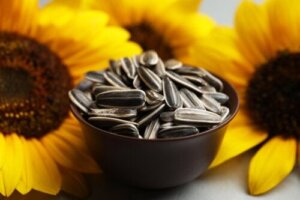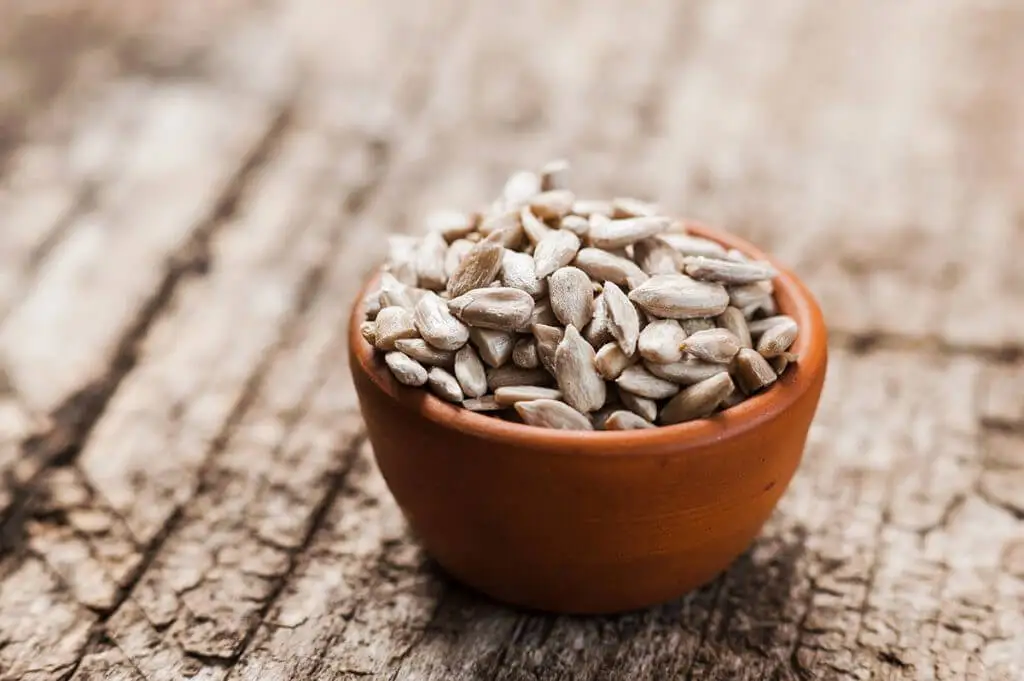Can You Eat Sunflower Seed Shells?


Written and verified by the nutritionist Saúl Sánchez Arias
Sunflower seeds are recommended foods for health, as they contain essential nutrients of high quality. However, the consumption of sunflower seed shells should be avoided, as it could be counterproductive. This is explained in detail below.
Please note that sunflower seeds contain a large amount of unsaturated fatty acids. These are able to protect cardiovascular health, thus modulating the levels of inflammation in the body. Their consumption is recommended, although in moderation, as they are very high in calories.
Avoid eating sunflower seed shells
The main problem with sunflower seed shells is that it can cause damage to the digestive tract due to its sharp nature. It may cause cuts, sticking, or accumulate in the diverticula of the intestine in people prone to them.
Similarly, the shells don’t have a remarkable nutritional value, unlike the flesh inside. Sunflower seeds stand out for their omega-3 fatty acid content. These have been shown to be useful in the treatment of some inflammatory pathologies such as rheumatoid arthritis.
In addition, sunflower seeds have significant protein content, which is essential to ensure good muscle health, as stated in a study published in the journal Nutrients. Adequate and regular consumption of these nutrients prevents the loss of lean mass and the onset of sarcopenia.
The fatty acids themselves are also capable of preventing the catabolism of muscle mass, which has a positive impact on health status. In older individuals, the regular intake of these nutrients is a determining factor. In fact, their supplementation is sometimes considered to avoid deficiencies or deficits.
On the other hand, we shouldn’t forget that these foods provide essential micronutrients. Calcium would be one of the most impressive due to its concentration, and it’s necessary for the maintenance of bone density. Thanks to calcium, the risk of suffering fractures is reduced in the medium term.
Find out more: 5 Signs That You’re Deficient in Omega-3 and Omega-6 Fatty Acids
Risks of consuming sunflower seed shells

Ingestion of sunflower seed shells can cause structural damage to the gastrointestinal tract. Even if this doesn’t happen, it may increase the risk of experiencing diarrhea or nausea.
This is mainly due to its high fiber content, which generates a laxative effect when consumed in large quantities. On the other hand, there have been cases of obstructions of the rectum from an accumulation of this kind of waste.
The intake of dietary fiber is necessary, but in adequate amounts. In addition, it’s necessary to make sure that it’s a type of fiber that doesn’t create clogging in the digestive tract.
It’s always advisable to emphasize the soluble type, as it ferments and produces a positive impact on the intestinal microbiota, as evidenced by research published in Gut Microbes.
Find out more: 7 Ways to Increase Your Fiber Intake and Combat Constipation
What can they be used for?

As we’ve explained, it isn’t recommended to consume sunflower seed shells. However, it is possible to find other uses for them. For example, they can be used to produce oils and fertilizers. In this way, they can be used as fertilizer to ensure a good diversity of the native flora of an area.
There are even industries that manage to transform these elements into useful consumables for animals, such as chicken litter. There’s also the possibility of using the shells as raw material in biomass energy systems, thus obtaining a useful resource.
However, their use isn’t yet widespread. A large amount of sunflower seed shells are wasted after extracting the seed inside. Although more and more industries are able to reuse human food waste, it’s a sector to be exploited.
Don’t eat sunflower seed shells
As we’ve already mentioned, consuming sunflower seed shells is counterproductive. It could even be really dangerous for health if the person in question has a tendency to form diverticula. For this reason, we recommend that you always throw them away.
If you need to increase your fiber intake, there are other much safer and effective solutions that will ensure a better intestinal transit. In this way, there’ll be an increase in microbiota biodiversity and better digestive health.
In any case, keep in mind that, even though they aren’t valid for human consumption, sunflower seed shells have applications in industry. Although this is an area that hasn’t been well exploited, they are a good substrate to create biomass and even fertilizer.
All cited sources were thoroughly reviewed by our team to ensure their quality, reliability, currency, and validity. The bibliography of this article was considered reliable and of academic or scientific accuracy.
- Gioxari A, Kaliora AC, Marantidou F, Panagiotakos DP. Intake of ω-3 polyunsaturated fatty acids in patients with rheumatoid arthritis: A systematic review and meta-analysis. Nutrition. 2018 Jan;45:114-124.
- Landi F, Calvani R, Tosato M, Martone AM, Ortolani E, Savera G, D’Angelo E, Sisto A, Marzetti E. Protein Intake and Muscle Health in Old Age: From Biological Plausibility to Clinical Evidence. Nutrients. 2016.
- Holscher HD. Dietary fiber and prebiotics and the gastrointestinal microbiota. Gut Microbes. 2017 Mar 4;8(2):172-184.
This text is provided for informational purposes only and does not replace consultation with a professional. If in doubt, consult your specialist.








